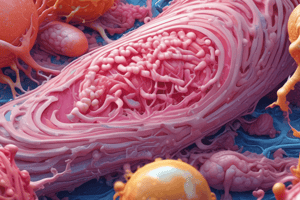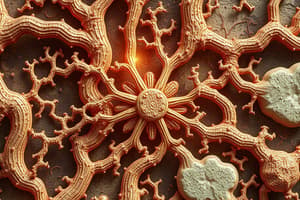Podcast
Questions and Answers
What is the most abundant tissue type in the body?
What is the most abundant tissue type in the body?
- Epithelial tissue
- Muscle tissue
- Connective tissue (correct)
- Nervous tissue
What are the three types of fibers found in the ground substance of connective tissue?
What are the three types of fibers found in the ground substance of connective tissue?
- Collagen, elastic, and reticular (correct)
- Collagen, elastic, and adipose
- Collagen, adipose, and reticular
- Muscle, elastic, and reticular
What is the classification of connective tissue based on?
What is the classification of connective tissue based on?
- Location in the body
- Function in the body
- All of the above
- Cellular and extracellular components (correct)
Which type of connective tissue is associated with the digestive tract?
Which type of connective tissue is associated with the digestive tract?
What is the function of adipose tissue?
What is the function of adipose tissue?
What is the mineral responsible for the strength of bone tissue?
What is the mineral responsible for the strength of bone tissue?
What is the function of leukocytes in blood?
What is the function of leukocytes in blood?
Flashcards
Most abundant tissue type?
Most abundant tissue type?
Connective tissue is the most abundant tissue type in the body.
Fibers in connective tissue?
Fibers in connective tissue?
Collagen, elastic, and reticular fibers are the three types of fibers found in the ground substance of connective tissue.
Connective tissue classification?
Connective tissue classification?
Connective tissue is classified based on its cellular and extracellular components.
Tissue in digestive tract?
Tissue in digestive tract?
Signup and view all the flashcards
Function of adipose tissue?
Function of adipose tissue?
Signup and view all the flashcards
Mineral for bone strength?
Mineral for bone strength?
Signup and view all the flashcards
Function of leukocytes?
Function of leukocytes?
Signup and view all the flashcards
Study Notes
Overview of Connective Tissue: Components, Classification, and Specializations
- Connective tissue is the most abundant tissue type in the body.
- It consists of cells and an extracellular matrix made up of a ground substance and protein fibers.
- The ground substance contains three types of fibers: collagen, elastic, and reticular.
- Connective tissue is classified based on the composition of its cellular and extracellular components and its function in the body.
- Proper connective tissues include loose and dense connective tissue, with dense regular connective tissue making up tendons and ligaments, and dense irregular connective tissue associated with the digestive tract.
- Embryonic connective tissue, derived from mesoderm, includes mesenchyme and mucous connective tissue, with mesenchyme found within the embryo and mucous connective tissue found in the umbilical cord.
- Specialized connective tissues include cartilage, adipose tissue, bone, and blood.
- Adipose tissue stores fat and synthesize hormones, growth factors, and some inflammatory mediators.
- Bone tissue has a mineralized extracellular matrix, with calcium phosphate responsible for its strength.
- Blood is a fluid connective tissue that transports gases, nutrients, and wastes throughout the body, with erythrocytes carrying oxygen and carbon dioxide, leukocytes responsible for immune and allergic responses, and thrombocytes forming clots and initiating repair of injured blood vessels.
- Understanding the classification and components of connective tissue can aid in identifying and diagnosing tissue types.
- Tissue quizzes and worksheets can aid in learning and cementing knowledge of connective tissue.
Studying That Suits You
Use AI to generate personalized quizzes and flashcards to suit your learning preferences.




